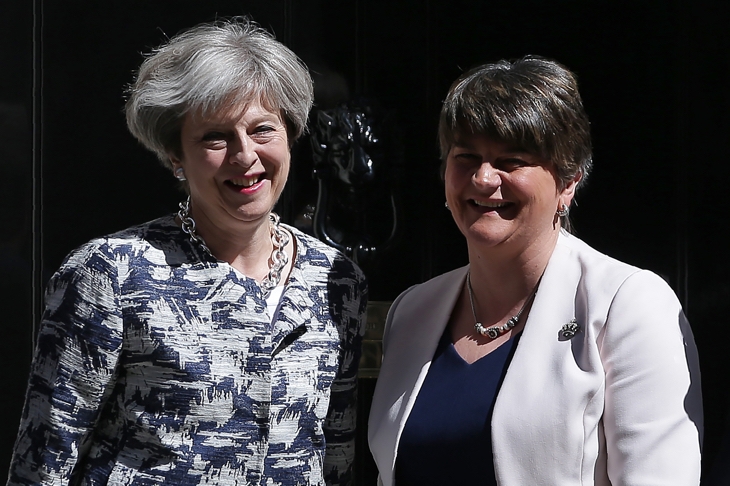A political party barely known outside Northern Ireland now holds the balance of power in Parliament. Nobody saw it coming, but then that’s the new catchphrase in politics. So who are the DUP? And do they deserve the pillorying that has been coming their way since the general election catapulted them into the spotlight?
I have been watching the party up close for decades. Yet while the DUP isn’t always a pretty sight to behold, the party is much more complicated than the hysterical stereotyping makes out. It’s true that the DUP has its roots in uncompromising unionism and religion. And for many years it was little more than a one-man’s fan club: the political extension of Ian Paisley’s hardline Free Presbyterian Church. But the party isn’t just comprised of a denomination representing a small proportion of Northern Ireland Protestants; and the DUP’s path to centre stage was won through a combination of events, luck, political upheaval, strategy, low cunning, ruthless opportunism and pragmatism. Flexibility is also a key feature of the party’s success – and the ability of the DUP’s politicians to sound right-wing in the morning and left-wing in the afternoon, depending on the issues, has helped the party secure success at the ballot box.
This shift towards the centre ground happened largely as a result of Peter Robinson, Paisley’s long-term deputy and eventual successor, and his ability to steer the party well beyond its traditional base. The pulpit politics are now long gone, with the rallying slogan of ‘Smash Sinn Fein’ replaced by (an admittedly broken) power-sharing pact in Northern Ireland. The religious views of the DUP’s current leader, Arlene Foster, also speak of this change: her Anglican Church of Ireland denomination was once furiously denounced by Ian Paisley for its Romeward tendencies.
Yet while it’s true the party has changed, the DUP’s critics say this journey has still been much too slow – with a long way left to travel. The social conservatism is there in its opposition to gay marriage and liberalisation of abortion law. But don’t expect such issues to feature in any workings with Theresa May. That would be to underestimate the DUP’s street smart pragmatism.
Anti-gay comments made by DUP politicians over the years will doubtless redden some Conservative faces. It’s worth noting the dates on most – though not all – of them. Clearly, efforts have been made to get people to shut up. Maybe some lessons have been learned, too. But at this stage any attempt to change party policy on gay marriage would risk a serious internal implosion. The Paisleyite imprint is still there at grassroots level.
Late last year, the DUP backed the ‘Turing Law’ measure, pardoning gay people previously convicted of now-abolished offences. Extending that to Northern Ireland did cause some unrest within the party. That’s not surprising. It was a de facto repudiation of the failed Paisleysite ‘Save Ulster from Sodomy’ campaign against the decriminalisation of homosexuality in the 1980s. The Turing Law support did not receive massive media attention – and that probably suited the party leadership.
The current DUP bashing on abortion has meanwhile been undermined somewhat by a poor grasp of facts. The party has been solely blamed for the highly restrictive abortion law in Northern Ireland. Yet rightly or wrongly, there is no appetite among the main Northern Ireland parties for major liberalisation of abortion law. This goes way beyond the DUP. Sinn Fein also opposes the extension of the 1967 Abortion Act to the province. So too does the SDLP, sister party of the Labour Party. Paul Mason has been among those to pile into the DUP recently, tweeting:
‘It is also important to remember that Labour’s sister party in Northern Ireland, the SDLP, takes the same hardline stance on abortion, and I would hope to see Jeremy Corbyn address this’.
This seems to ignore the fact that given that opposition to the 1967 Act has been a core SDLP principle for decades, a phone call from Jezza is unlikely to make much difference. Understandably, there are many DUP opponents in Northern Ireland taking great delight in the scrutiny and brickbats now coming the party’s way. Some of these critics are also pointing out a heavy irony – liberal opinion seems to be that the DUP should be kept far away from the corridors of power. Unless those corridors are in Northern Ireland. Then it’s fine, apparently.
Scrutiny is a good thing. But what looks to many like a new form of Paddy bashing? Not so much. The key question now is how well the DUP’s pragmatism will serve it. Can the party avoid the temptation of over-playing its hand? What happens next will have a massive bearing not just in Westminster, but on the faltering efforts to restore power-sharing devolution in Northern Ireland. No pressure. No pressure at all.
David Gordon is a journalist, author of The Fall of the House of Paisley and a former press secretary to the power-sharing Northern Ireland Executive






Comments